Ultimate Guide to Choosing the Right Preschool Homeschool Curriculum

Welcome, homeschoolers! At Minibop, we understand that choosing the right preschool homeschool curriculum is a crucial step in your homeschooling journey. While our passion is supporting homeschool learning through music, we know that a well-rounded education encompasses much more.
This is the ultimate guide to choosing the right preschool homeschool curriculum for the 2024-2025 school year.
Understanding Your Homeschooling Goals

Define Your Educational Goals
Before diving into curriculum options, take a moment to reflect on your homeschooling goals. Are you aiming for academic excellence, fostering a love of learning, focusing on character development, or perhaps a combination of these? Your goals will serve as a compass in your curriculum selection process. Understanding your objectives helps narrow down the vast array of available choices to those that align best with your family’s vision and goals.
Consider Your Child’s Learning Style
Every child is unique, and understanding how your child learns best is crucial in selecting an effective curriculum. Some children are visual learners who benefit from pictures, diagrams, and written instructions. Others are auditory learners who thrive on verbal instructions, discussions or music.
Then there are kinesthetic learners who learn best through hands-on activities. Observe your child during different activities to identify their preferences. Most children have a mix of learning styles, so it’s beneficial to choose a curriculum that accommodates multiple approaches.
Of course it can be hard to know your child’s learning style at preschool age, which is why its best to try different things until you discover what works best. How can you tell? For preschoolers, whatever sort of play captivates their attention the most is likely the best way to introduce learning. For many children, that’s musical play.
Types of Preschool Homeschool Curriculums
Traditional Curriculum
Traditional preschool homeschool curriculums are structured and often aligned with state standards, making them a solid choice for families new to homeschooling. They typically use textbooks and workbooks, providing a comprehensive coverage of subjects. While they can be straightforward and easy to follow, they may feel rigid and less adaptable to your child’s unique learning style, and sometimes they can be expensive.
Online Curriculum
Online curriculums offer flexibility and accessibility, making them a popular choice. They often include interactive content and can be self-paced, which is great for busy families. However, they require a reliable internet connection and might limit hands-on learning experiences. Additionally, managing screen time is something to consider. For preschool aged children, a screen-based online curriculum may not be appropriate.
Eclectic Curriculum
The eclectic approach allows you to pick and choose from various resources and methods, creating a customized curriculum that fits your child’s interests and needs. This can be more engaging for children and allows for a highly tailored educational experience. However, it requires more planning and organization and can be time-consuming to put together. Ensuring there are no gaps in learning requires careful planning.
Unschooling
Unschooling is a child-led, interest-driven approach to learning. It fosters independence and creativity by allowing children to explore their interests deeply. While this can be very engaging, it’s less structured and might not suit all families. It can also be challenging to track progress and may not align with state requirements in some areas.
Exploring Different Preschool Homeschool Approaches

Now that you have an overview of the different types of preschool homeschool curriculums, let’s take a closer look at some specific approaches. Each one offers unique ways to engage your preschooler, allowing you to tailor learning to your child’s personality and needs. Whether you prefer a more structured method or a child-led philosophy, these approaches can provide guidance:
- Montessori: Montessori focuses on hands-on, self-directed learning. Children are encouraged to explore materials at their own pace, learning through practical life activities like pouring, sorting, and cleaning. These activities help them develop independence and fine motor skills. This approach works well for families who want a balance of structure and flexibility, where the child leads their own learning journey.
- Waldorf: Waldorf education emphasizes imagination and creativity through storytelling, art, and outdoor play. It nurtures a child’s holistic development by creating a warm, nurturing environment, and it delays formal academics until the child is older. This approach is perfect if you’re looking for a gentle introduction to learning that prioritizes creativity and emotional well-being.
- Reggio Emilia: Reggio Emilia is a child-centered, inquiry-based approach. It allows children to learn through exploration and collaboration, with learning projects often based on the child’s interests. Parents act as co-learners, supporting their child’s curiosity and discoveries. If you prefer learning that emerges naturally from your child’s interests, this method may be ideal.
- Charlotte Mason: This method emphasizes rich literature, nature study, and the arts. Instead of traditional textbooks, Charlotte Mason uses “living books”—engaging and thought-provoking texts—to introduce children to various subjects. If you want to cultivate a love for reading and outdoor exploration, this approach can create a broad and enriching homeschool experience.
Each of these approaches can be adapted to fit a homeschool setting. The best part is, you don’t have to stick to just one method—you can mix and match to create a program that’s perfect for your child.
Now that you’ve explored these approaches, let’s dive into one of the most effective methods for preschool learning: play-based learning.
Play-Based Learning: A Natural Fit for Preschool Homeschooling
Now that we’ve explored different educational approaches like Montessori, Waldorf, Reggio Emilia, and Charlotte Mason, it’s important to understand how play-based learning fits into the picture. While some of these methods incorporate play to varying degrees, play-based learning is a broader category that emphasizes child-led, hands-on exploration and discovery. This method is especially well-suited to preschoolers, who naturally learn best through play.
Play-based curriculums are designed to nurture curiosity and creativity while building foundational skills in a stress-free environment, making learning both effective and enjoyable.
Benefits of Play-Based Learning
- Encourages Holistic Development: Play-based learning helps children develop essential skills across cognitive, social-emotional, and physical areas. Activities like building blocks or pretending to cook engage problem-solving abilities, while group play fosters teamwork and communication. The playful environment also supports emotional development by allowing children to express their feelings and navigate social situations.
- Fosters a Love of Learning: Because play is inherently enjoyable, children are naturally motivated to engage in the learning process. A play-based curriculum nurtures a lifelong love of learning by making education feel fun and exciting rather than rigid or forced.
- Tailored to Individual Learning Styles: Play-based learning naturally accommodates different learning styles, whether your child is more visual, auditory, or kinesthetic. Activities like musical play, which we at Minibop love to integrate, help auditory learners thrive, while building with blocks or painting is perfect for kinesthetic learners.
- Supports Academic Readiness: While play-based learning may seem less structured, it effectively builds the skills children need for more formal education. Through playful activities, children develop literacy, numeracy, and problem-solving skills that prepare them for future academic challenges. This is the science behind Minibop’s CLIMB Curriculum.
Alternatives to Play-Based Learning
While play-based learning is highly effective for preschool-aged children, other approaches may also be considered. Some families might opt for a structured curriculum that closely follows state standards or focuses on academic achievement. These curriculums often involve more formal instruction and worksheets, which can be useful but may feel too rigid for the preschool stage.
Another alternative is eclectic homeschooling, where you blend play-based learning with structured activities, hands-on projects, and online resources. This can provide a more tailored experience, although it requires careful planning.
However, for preschoolers, play-based learning is often the most suitable approach. At this age, children are wired to learn through exploration and discovery, making it an ideal foundation for early education.
Secular vs. Religious Preschool Homeschool Curriculums
When choosing a homeschool curriculum, one important decision is whether to opt for a secular or religious-based program. This choice often depends on your family’s beliefs and educational goals.
Secular Homeschool Curriculums
Secular curriculums focus on academic subjects without incorporating religious beliefs or teachings. They are designed to be neutral in terms of faith and are often aligned with public school standards.
Pros of secular curriculums:
- Align well with state standards and public school curricula
- Provide a neutral foundation for families of all beliefs
- Often include up-to-date scientific information
Cons of secular curriculums:
- Can be challenging to find, as many homeschool materials have religious content
- May not address character development or values education as comprehensively
Religious / Christian Homeschool Curriculums
Religious curriculums such as The Good and the Beautiful integrate faith teachings with academic content. They may include Bible study, character development based on religious principles, and a religious perspective on subjects like science and history.
Pros of religious curriculums:
- Align with families’ faith-based values
- Often include character development and values education
- Wide variety of options available
Cons of religious curriculums:
- May not align with public school standards in some areas
- Can be challenging for families transitioning back to public school
Finding Quality Secular Materials
Many homeschool families note that finding high-quality secular materials can be challenging, as a significant portion of homeschool education companies focus on religious or Christian aspects. However, there are resources available:
- Online forums and communities: Platforms like r/homeschool on Reddit can be valuable for finding recommendations and discussing secular curriculum options with other homeschoolers.
- Secular homeschool curriculum providers: Some companies specialize in creating secular homeschool materials. Research options like Minibop, Build Your Library, Blossom and Root, or Torchlight Curriculum.
- Adapting religious materials: Some families choose to use religious curricula and adapt or omit the faith-based content as needed.
- Public school resources: Many public school textbooks and materials are available for purchase and can be used in a homeschool setting.
- Online learning platforms: Websites like Khan Academy offer free, secular educational content across a wide range of subjects.
Remember, the choice between secular and religious curricula is personal and should align with your family’s values and educational goals. Many families find success in mixing and matching resources to create a curriculum that works best for them.
Understanding State Requirements for Homeschooling

One crucial aspect of homeschooling that families must consider is understanding and complying with state requirements. While this usually ins’t required at the preschool level, it’s something you want to start preparing for if you intent to continue homeschooling at the elementary school level.
Homeschooling laws and regulations vary significantly from state to state, and it’s essential to be aware of your state’s specific requirements to ensure legal compliance.
Researching Your State’s Homeschool Laws
Before starting your homeschool journey, thoroughly research your state’s homeschool laws. These laws can cover various aspects, including:
- Notification requirements
- Attendance records
- Subject requirements
- Teacher qualifications
- Assessment or testing requirements
- Immunization records
The Home School Legal Defense Association (HSLDA) provides a comprehensive state-by-state guide to homeschool laws, which can be an excellent starting point for your research.
Filing Requirements

Many states require homeschooling families to file certain documents or notices. These may include:
- Intent to Homeschool: Some states require parents to submit a notice of intent to homeschool to their local school district or state education department.
- Curriculum Plans: Some states may ask for an outline of your planned curriculum or subjects to be taught.
- Student Progress Reports: Certain states require periodic progress reports or portfolios of student work.
- Standardized Testing: Some states mandate that homeschooled students participate in standardized testing at specific grade levels.
Record Keeping
Regardless of your state’s specific requirements, it’s a good practice to keep detailed records of your homeschooling activities. This can include:
- Attendance records
- Curriculum used
- Completed coursework
- Grades or progress assessments
- Extracurricular activities
Good record-keeping can be beneficial if you need to transfer to a traditional school, apply for college, or if your homeschooling practices are ever questioned.
Staying Informed
Homeschool laws can change, so it’s important to stay informed about any updates or modifications to your state’s requirements. Joining local homeschool groups or associations can be a great way to stay up-to-date and connect with other homeschooling families who can share their experiences and insights. Remember, understanding and complying with state requirements is an essential part of your homeschooling journey. It ensures that you’re providing a legally recognized education for your child and can help avoid potential legal issues down the road.
Socializing in a Homeschool Environment
After understanding the legal requirements and curriculum options for homeschooling, you might be wondering, “How will my child socialize?” Socialization is one of the most common concerns for homeschool families, but there are plenty of ways to ensure your child interacts with peers and develops strong social skills, even if you live in a rural area.
Here are some helpful tips for creating social opportunities:
- Join Local Homeschool Groups: Many communities have homeschool co-ops or support groups that arrange group activities, field trips, and shared learning experiences. Even in rural areas, you can find homeschool networks online through platforms like Facebook, Reddit or local homeschooling forums.
- Enroll in Extracurricular Activities: Look for nearby opportunities like dance classes, sports teams, music lessons, or library story times. These activities provide great opportunities for social interaction while helping your child develop other important skills.
- Organize Playdates: Reach out to other homeschool families or neighbors with children to arrange regular playdates. These can be as simple as meeting at a park or having children play at each other’s homes, allowing for social interaction in a relaxed setting.
- Use Community Resources: Take advantage of local libraries, museums, or community centers, which often offer educational programs or events for young children. These settings allow children to socialize while also exploring new learning opportunities.
- Explore Online Social Communities: In rural areas where in-person activities may be limited, consider virtual playdates or joining online homeschool groups. Some platforms even offer virtual field trips or collaborative projects, allowing your child to interact with others remotely. Minibop’s CLIMB Hub offers virtual group music classes so your little one can socialize from home.
- Volunteer as a Family: Volunteering at community events or participating in service projects can be a great way for your child to interact with a variety of people while developing a sense of empathy and responsibility.
By making an effort to incorporate these social opportunities, you can ensure your child thrives not only academically but also socially in a homeschool setting.
Now that you’re equipped with strategies for socialization, let’s consider some other important factors when choosing a preschool homeschool curriculum.
Factors to Consider When Choosing a Preschool Homeschool Curriculum
Accreditation
Accreditation ensures that a curriculum meets certain educational standards, which can be important if you plan to transition back into the traditional school system or want to ensure a rigorous academic experience. Accredited programs are reviewed and approved by educational authorities, providing peace of mind. The Homeschool Legal Defense Association offers great resources on accredited programs.
Budget
Homeschooling doesn’t have to break the bank. There are plenty of budget-friendly options available, from free online resources to second-hand books. With careful planning, you can provide a quality education without spending a fortune. At the same time, be prepared to get what you pay for. Piecing together many “low cost” resources can make costs add up quickly.
Flexibility
Flexibility is key, especially with young children. You’ll want a preschool homeschool curriculum that can adapt to your child’s pace and interests. Programs that allow for some wiggle room in your schedule and activities can be particularly beneficial. Choose a curriculum that is designed to be flexible or modular so you can skip around when necessary without derailing your routine.
Support and Resources
Consider the support and resources that come with the curriculum. Are there teacher guides, online communities, or local support groups available? A subscription to Minibop’s CLIMB Preschool Homeschool Curriculum gives you access to all that and more. Having a support network can make your homeschooling journey much smoother.
Incorporating Music into Your Preschool Homeschool Curriculum

While choosing your core homeschool curriculum, don’t forget the importance of music education. At Minibop, we believe that music enhances overall learning and development. Consider these tips for integrating music into your homeschool routine:
- Use educational songs to reinforce concepts in other subjects.
- Incorporate rhythm activities to improve math skills.
- Explore music history alongside general history lessons.
- Allow time for instrument practice or music appreciation.
Consider using educational songs to reinforce concepts, exploring music history alongside general history, and setting aside time for instrument practice or music appreciation. Resources like Minibop’s CLIMB Curriculum for homeschool can help you integrate music effectively into your homeschool routine.
Assessing and Adjusting Your Curriculum
Remember, choosing the right homeschool curriculum is a journey. Be prepared to assess and adjust as needed. Pay attention to your child’s progress and interests, and be flexible enough to make changes if something isn’t working. Your preschooler’s learning style may change between age 3 to 5. The ability to tailor education to your child’s needs is one of the greatest advantages of homeschooling.
Time Management and Scheduling
Creating a homeschool schedule can help keep your family on track. Establish a routine that includes time for core subjects, breaks, extracurricular activities, and free play. Be mindful of your child’s natural rhythms and energy levels, and adjust your schedule accordingly to keep learning effective and enjoyable. Read our expert tips on creating an effective preschool homeschool schedule here.
Supplementary Materials and Resources
Enhance your preschool homeschool curriculum with supplementary materials and resources. Books, educational games, and apps can provide additional learning opportunities. Websites like Khan Academy and Starfall offer quality educational content for free. Don’t forget to include resources from Minibop to enrich your homeschool experience.
Conclusion
Choosing and using the right preschool homeschool curriculum is a journey, not a destination. Be patient with yourself and your children as you find what works best for your family. Remember, one of the greatest advantages of homeschooling is the ability to tailor education to your child’s needs and interests—including the integration of subjects like music that can enhance overall learning.




1 thought on “Ultimate Guide to Choosing the Right Preschool Homeschool Curriculum”
This is so helpful! I’m new and just getting started with researching a homeschool preschool curriculum for my little one and I’m overwhelmed but this makes me feel better 🙂